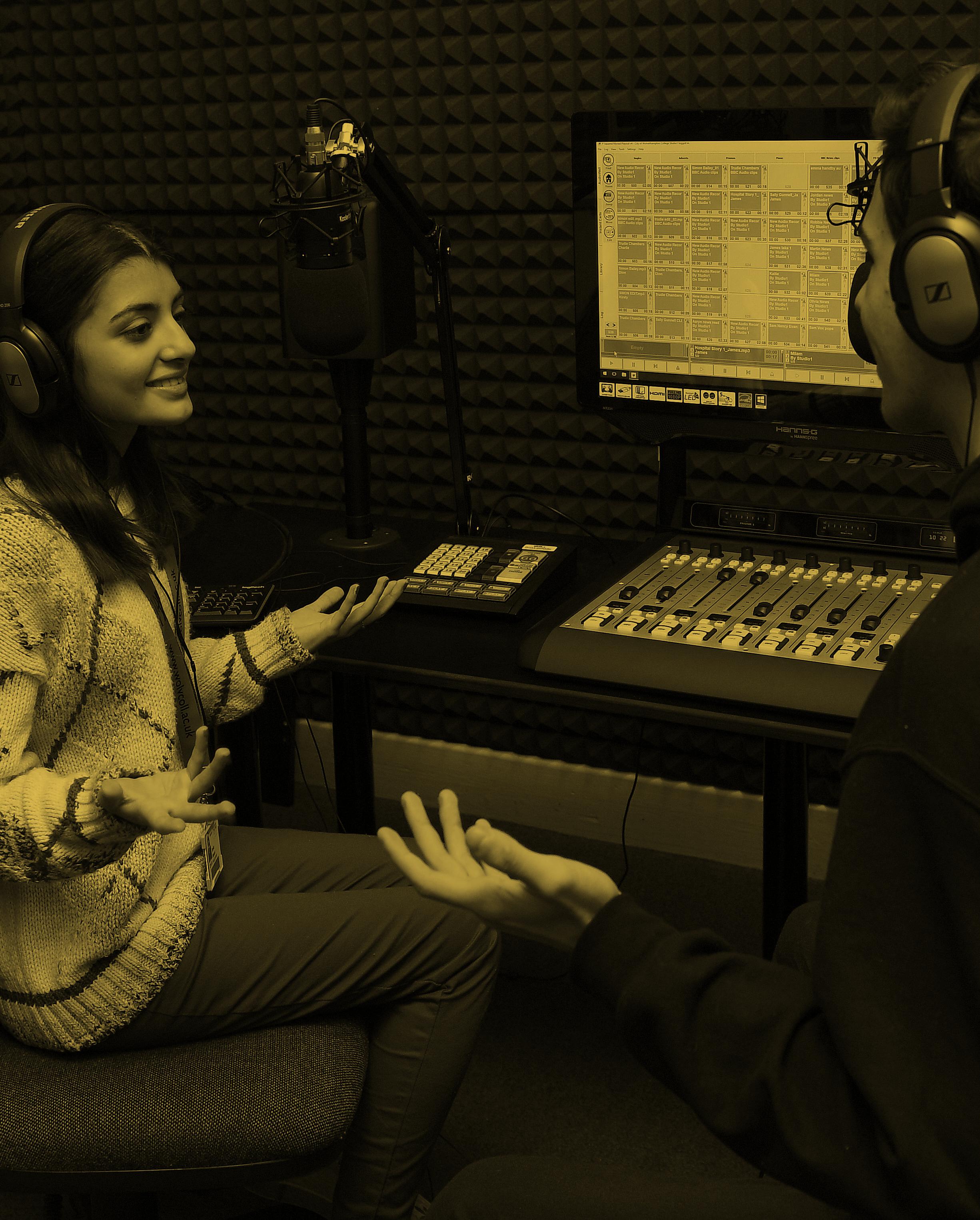
12 minute read
Creative and journalism apprenticeships
The college offers the following creative and journalism apprenticeships:
Creative Venue Technician – Level 3 Junior journalist – Level 3
Advertisement

Creative and Journalism Facilities
The college has a dedicated creative training department at the Paget Road campus in Compton equipped with a host of industry-standard facilities including: • TV studio and editing suites with
HD cameras & industry software • Radio broadcasting suite • Digital recording studios • Mac suite for music composition and sequencing • Print and fashion room • 3D games design studio with high spec
PCs and VR headsets • Fine arts and graphics studio • Photographic studio • Dance and performing arts studio and stage
The college also has a live sound venue at the Slade Rooms in the city centre and was named as Training Provider of the Year for its creative arts course at the Creative and Cultural Skills Awards 2019.
All of the tutors in the department have worked in the creative industry and apprentices will not only be taught the latest skills but will benefit from their knowledge and experience too.
CREATIVE VENUE TECHNICIAN - ST0106
Role profile
Creative venue technicians (CVTs) operate under the direction and supervision of a production arts technical management team and provide technical support for the construction, rehearsal, presentation and removal of a live performance, for audience or camera. They are multi-skilled across a wide range of technical disciplines, possess a broad level of knowledge relevant to the diverse environment in which they operate, and play an active role in the technical operation across a variety of established creative venues, for example, theatres, arts centres and broadcast studios. Technicians will be competent in lighting, audio, video and building services related to the performance arts and apply them to their resident premises and / or production. They will also be skilled in stagecraft techniques - such as carpentry, operating stage machinery and performing scene changes - allowing them to set up, rig, operate, maintain and repair technical equipment as used in creative venues to facilitate the rehearsal and presentation of live performance e.g. scenery, luminaires, fixtures, audio and video apparatus. They can read, interpret and give appropriate technical information to colleagues and clients, and can safely use a variety of tools to assemble, install and maintain scenery and equipment for stage and screen. Technicians undertake tasks both autonomously and as part of a team, taking ownership of the output standard and, with guidance will use their skills to realise and respond to the development of the creative team’s vision. They are responsible for the upkeep of their resident venue or touring production - for example, focussing lanterns, fitting radio mics, assembling scenery and programming lighting, audio, video, automation and other control systems – and will undertake venue maintenance duties such as housekeeping, re-lamping, painting and basic venue repair work. Typical job roles include venue technician, theatre technician, stage technician, lighting technician, sound technician, video technician and automation technician.
CORE KNOWLEDGE, SKILLS AND BEHAVIOUR REQUIREMENTS
KNOWLEDGE
Apprentices will develop knowledge of: Understanding the industry (terms and relationships): • Health and safety standards including manual handling, work at height, provision and use of work equipment, construction (design and management), noise, first aid, working hours, electricity at work, fire & emergency procedures, accident reporting and Technical
Standards for Places of Entertainment • Security and control of equipment protocols • Management structures within a venue, etiquette and culture, including communication protocols and interdependencies of departments • Relevant industry bodies and their roles e.g.
HSE, ABTT, BECTU • Principles of stage and production management • Creative venue safety systems • History, styles, architecture, terminology and acoustics of creative venues • Planning: • Selection of the correct tools and equipment for tasks such as assembling scenic components and truss and rigging lighting, audio and video equipment • Computer-aided design – viewing, extracting information and realising specifications from system designs e.g. stage plans, lighting plans and sound schematics • Environmental and sustainability protocols e.g. correct disposal of different lamp types and electronic equipment, reduction in use of
PVC products • Approaches to problem solving – to achieve the creative team’s requirements within the appropriate venue or production’s resources • Production processes, performance and maintenance: • Agreed industry safe working procedure: e.g.
The Code of Conduct for Get-ins, Fit-ups and
Get-outs • Recognition of production design elements – scenic, lighting, audio and visual e.g. means of scenic construction: timber, metal and textile • Properties of electricity, fixed and temporary electrical systems; theory, practice and safety e.g. to enable portable appliance testing of relevant technical equipment • Properties of mechanical and electromechanical systems e.g. to enable the assembly and monitoring of hydraulic systems for scenic effect • Lifting operations; theory and practice e.g. to enable monitoring of a lifting operation in compliance with LOLER such as performer flying • Identifying potential improvements to systems and procedures to better enable the realisation of the creative team’s vision for the production • Housekeeping – keeping venue work and storage areas clean, tidy and free from the build-up of waste materials
SKILLS
Apprentices will gain skills in the following areas: Understanding the industry (terms and relationships): • Be computer literate in word processing, spreadsheets and digital control systems to thereby assist in communication, planning, monitoring and operation of production processes, building services and creative venue technologies e.g. email, drafting reports, supplying technical information and
programming production control consoles • Comply with creative venue budgetary and financial management protocols • Communicate effectively with co-workers and manage work groups • Deal politely and respectfully with stakeholders, ranging from freelance, touring and venue staff to performers, community groups and the public • Diligently manage their own punctuality and working time as required by venue activities Planning • Prepare risk assessments and method statements to help ensure safe planning and delivery of work processes in the venue • Prepare and interpret system specifications e.g. ground plans, lighting plans and design drawings • Prepare written information and reports e.g. cue sheets, post-performance reports, handover notes • Production processes, performance and maintenance: • Competently use safety and access equipment e.g. personal and fall protection equipment, ladders, access towers and tallescopes • Assemble and configure structures and systems from component parts to production specification - such as scenic and rigging structures, lighting, sound, power, dimming, amplification and control systems • Undertake fault-finding of components and systems e.g. eliminating feedback in a live audio system • Under direction – deploy, operate and maintain technical equipment e.g. lighting: select appropriate luminaires and accessories, test, rig, connect and focus to plan • Operate hand and power tools safely e.g. podger, adjustable spanner, drill driver and jigsaw • Programme and operate computerised
control equipment e.g. lighting, sound and automation control desks • Set and change scenes in live performance – setting and striking scenic elements under
‘show conditions’ • Undertake cueing and live operation e.g. operating a followspot to a show plot • Operate suspension systems e.g. manual hemp, single and double purchase counterweight and automated theatrical flying systems • As directed – inspect, maintain and monitor venue and production systems e.g. emergency lighting, re-lamping, first line repairs, rig-check • Diligently undertake stage crafts such as scenic construction, carpentry, metalwork, stage machinery, props, scene changes, knots and terminations
BEHAVIOUR
Apprentices will demonstrate the following behaviours: • Take personal responsibility for safety of self and others • Have a flexible approach and will be adaptable to change • Willing to work unsociable hours in a variety of locations for extended periods • Punctual, reliable and personally responsible • Self-motivated with a positive and disciplined approach to work • Commitment to personal and professional development • Develop professional working relationships and treat others with respect using appropriate channels and etiquette • Have the drive and determination to complete a task on time
SUMMARY
Qualification Level Length Delivery model Entry requirements
Maths and English
Apprentice support and assessment
Progression
Employer support
Creative Venue Technician Apprenticeship 3 Typically 24 months Discussed on application Entry requirements will be determined by individual employers. Apprentices without Level 2 maths and English will be required to achieve this level prior to taking the end point assessment Throughout the programme the apprentice will receive expert training from highly qualified staff A qualified assessor will provide an induction and regular workplace assessments Completion of the programme will enable apprentices to work in a relevant role in the industry. A dedicated account manager will guide and support employers throughout the programme.
JUNIOR JOURNALIST - ST0285
Role profile
Journalists bring people the news and information from their street, community, town, city or around the world using a combination of words, pictures and moving images. They are able to work on their own competently and without immediate supervision in generating and producing stories for publication and/or broadcast. The apprenticeship programme covers three specialisms: • Print and associated digital platforms • TV/radio and associated digital platforms • Public relations (PR), corporate communications and associated digital platforms Apprentices will develop the core knowledge and skills required of a junior journalist, and will also gain additional specialist knowledge and skills for their chosen pathway
CORE KNOWLEDGE, SKILLS AND BEHAVIOUR REQUIREMENTS
KNOWLEDGE AND SKILLS
Apprentices will the develop knowledge and skills required of a junior journlist, enabling them to produce news and information for TV, radio, print and digital publications: • Know what a story is and how to carry out the necessary research and interviews • Build and maintain a range of reliable contacts • Create quality stories that are accurate, clear, vigorous, fair and balanced, in a form that will engage an audience • Work in an ethical manner and in accordance with relevant codes of conduct and demonstrate integrity • Work on getting stories ‘right the first time’ • Demonstrate an ability to write and use good
English to industry standard for all platforms • Produce content for digital platforms, including video and photographic material • Adept at using social media and digital platforms and techniques to source content, contacts and build an audience • Good communicator • Understand the importance and value of brands • Connect with the audience they serve • Work to tight deadlines • Technically proficient and able to understand/use web analytics • Understand how society works • Take and keep accurate notes and records • Gather, verify and make proper use of user generated content (UGC) • Gather, use and present data • Understand how the law affects the work of a journalist • Adhere to relevant health and safety legislation in the workplace • Understand the ‘news business’ with a knowledge of emerging trends in the media industry
In addition, apprentices will gain additional specialist knowledge and skills for their chosen area:
Print and associated digital platforms: • For most employers, write and accurately transcribe shorthand at 100 words per minute • Edit copy and write headlines for publication on different platforms • Take photographs suitable for publication • Report from a wide range of settings • Research and write clear, accurate, compliant and engaging stories and features for newspapers, magazines and websites • For some employers, be able to use data to contribute towards potential editorial content and strategies; and • Have a good working knowledge of regulation as laid out in the editors’ code
• Research and write clear, accurate, balanced, compliant and engaging stories for
TV and radio • For some employers, be able to write and accurately transcribe shorthand at 100 words per minute • Understand the techniques of interviewing for broadcast and can conduct a simple broadcast interview themselves • Demonstrate familiarity with the basic techniques and technology of broadcast news gathering, including the sourcing of material • Have an awareness of the basic set-up of radio and television news studios, operate simple radio and television equipment, and be familiar with the language and terminology of a broadcast newsroom • Show a good working knowledge of the key principles of broadcast regulation as laid out in the Ofcom Broadcasting Code and BBC editorial guidelines
Public relations (PR), corporate communications and associated digital platforms: • Understand how journalism in PR and corporate communications differs from journalism in other sectors • For some employers, be able to write and accurately transcribe shorthand at 100 words per minute • Prepare content for specific purposes (e.g. press releases, social media, brochures, exhibition boards) • Have a good understanding of the business (businesses) they work for • Know the difference between outputs (e.g. press releases, social media etc.) • Act as a mediator and facilitator between the media and employer. and desire to be a journalist, as well as demonstrate the following behaviours: • Hard-working attitude • Inquiring mind • Lively interest in current affairs • Ability to write and use words accurately and with effect • Persistence and determination • Willingness to embrace change and accept unsocial working hours. They must be able to demonstrate commitment and desire to be a journalist. They must • Professional attitudes to their job and how they present themselves for work • Understanding of the diversity of their audience. • Be prepared to work shifts • Be conscientious; enthusiastic and resilient • Be a team player • Have an ability and desire to carry out duties in accordance with the law, regulations and any appropriate codes of conduct • Have high personal standards in terms of discretion/confidentiality.
BEHAVIOURS
SUMMARY
Qualification Level Length
Delivery model Entry requirements
Maths and English
Apprentice support and assessment
Progression
Employer support
Journalism NCTJ Level 3 Diploma 3 Typically 18 months if the apprentice does not have any previous experience, however this may be reduced if they are part-qualified or have relevant experience. To be discussed on application Individual employers will identify any relevant entry requirements in terms of previous qualifications, training or work experience Apprentices without Level 2 maths and/or English will need to achieve this level prior to completion of the programme. Throughout the programme the apprentice will receive expert training from highly qualified staff A qualified assessor will provide an induction and regular workplace assessments Completion of the programme will enable apprentices to gain employment in the industry. A dedicated account manager will guide and support employers throughout the programme.

Drinks Dispense Technician Apprenticeships
The drinks dispense technician apprenticeship – developed by the college in conjunction with brewers and drinks manufacturers – is a UK-first and offers a structured programme to train drinks dispense technicians responsible for the installation and maintenance of equipment in pubs, clubs, bars, hotels, theatres, leisure centres and stadiums
The apprenticeship was launched in 2019 and has already attracted employees from a wide range of industry organisations including Marston’s, Vimto, T&J Installation and City Dispense.











